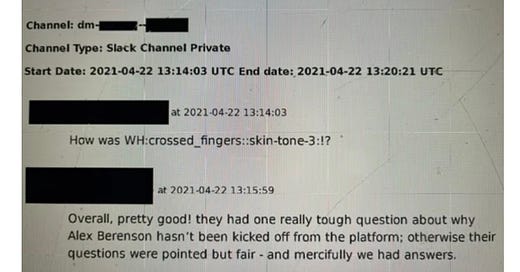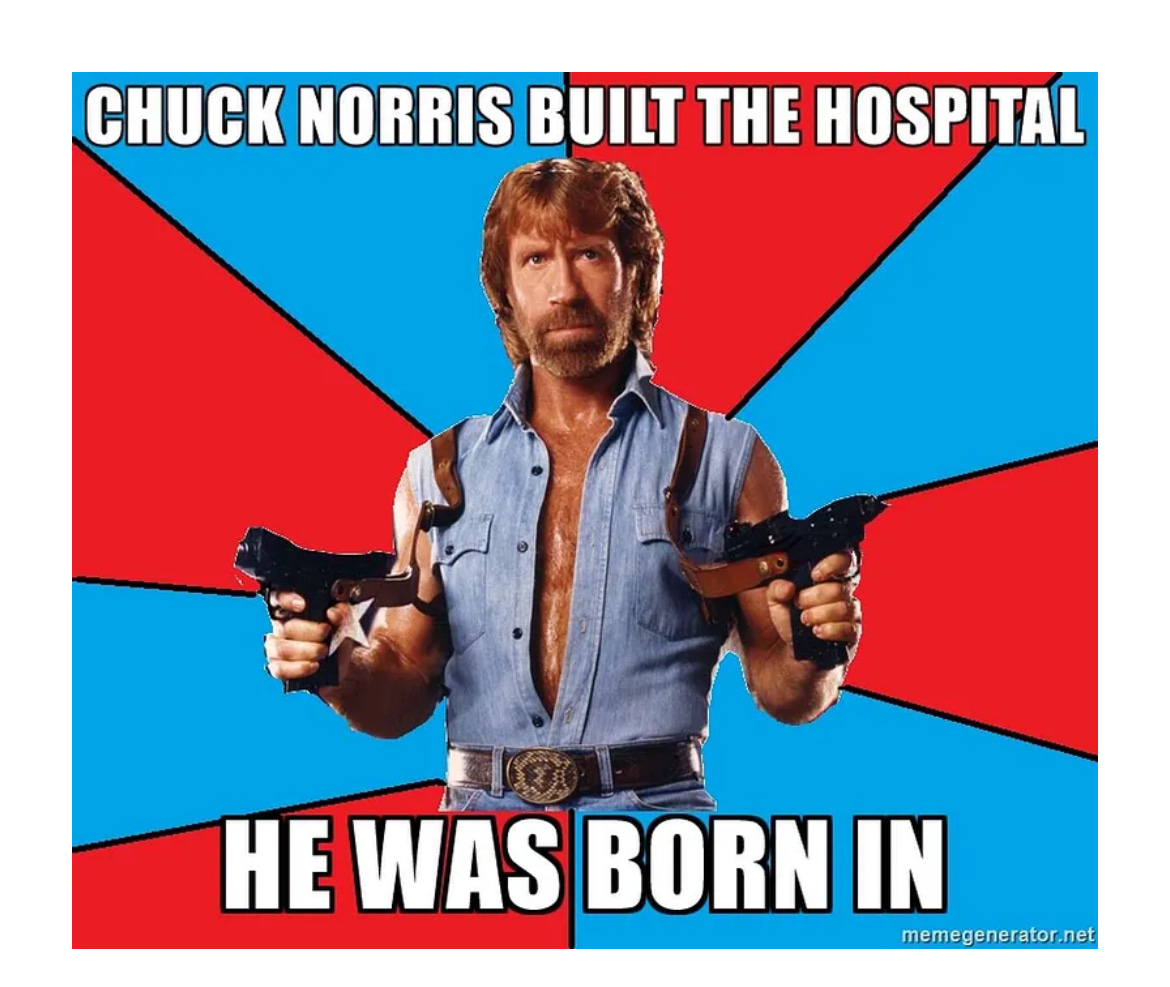How Berenson v Biden has been caught up in two big Supreme Court cases over government efforts to control free speech
Will we wind up waiting for decisions on them before we learn if my suit can move ahead? Only federal Judge Jessica G.L. Clarke knows...
This spring, the Supreme Court will decide a lawsuit brought by the state of Missouri over whether the federal government can press social media companies to censor their users.
The suit has become the most important First Amendment case in decades.
Last July, a federal district court ruled for Missouri, finding the Biden Administration had violated the Constitution by pushing tech companies to target users for legal speech. In September, a federal appellate court in Texas affirmed that ruling.
Now the Biden Administration has asked the high court to reverse those decisions, claiming they are wrong and hurt the government’s own right to inform the public. (The suit, first known as Missouri v Biden, is now called Murthy v Missouri, for Surgeon General Dr. Vivek Murthy, one of the Biden appointees appealing the ruling.)
And I doubt anyone - even the plaintiffs - is watching the case more closely than I am.
—
(Is your right to free speech worth 20 cents a day? If it is, you know what to do.)
—
The outcome in the Missouri case may be crucial to Berenson v Biden, my lawsuit against the White House and senior Pfizer officials for their efforts to censor me and force Twitter (now called X) to ban me and my reporting on mRNA Covid jabs in 2021.
I filed Berenson v Biden in New York in April 2023, drawing on documents I received as part of my earlier and successful lawsuit against Twitter over the ban.
The documents include a discussion inside Twitter of a meeting in April 2021 at which Andy Slavitt asked Twitter a “really tough question” about why it had not already banned me.
At the time, Slavitt was senior advisor to the White House Covid response team. He officially left the government in June 2021 but remained in contact with the Biden administration and kept pushing Twitter to ban me. Meanwhile White House and Pfizer officials applied further public and private pressure over what they called “misinformation.”
On August 28, 2021, they succeeded. Twitter banned me, claiming I had committed “repeated violations of [its] COVID-19 misinformation rules.” But just over 10 months later, the company settled my lawsuit against it by admitting it had violated its own rules in banning me and that my tweets “should not have led to [my] suspension.”
Crucially, the reinstatement was made by Twitter’s old management, months before Elon Musk took over the company and instituted an amnesty for banned accounts. As far as I know, I am the only person ever to be reinstated by any social media company after a ban lawsuit.
—
(Q: How was the White House, guys?
A: Oh, not bad, except when they asked us to violate the First Amendment!)
—
Berenson v Biden is both broader and narrower than the Missouri case.
It’s narrower because it focuses only on the specific censorship against me. But it is broader because it also includes two Pfizer officials as defendants, (as well as Slavitt, who is both a private and government defendant).
Thus Berenson v Biden can succeed even if the Supreme Court rules for the Biden Administration in the Missouri case. In addition to my First Amendment claim, I have made claims against the private defendants, who interfered with my contract with Twitter. I’ve also made a claim under a little-known federal statute called 1985(3), which prohibits private-public conspiracies to violate civil rights.
But if the Supreme Court rules in favor of Missouri, it is hard to see how my case will not - at a minimum - survive the defense motions to dismiss. (James Lawrence, who’s representing Berenson v Biden, plans to file an “amicus” brief to the Supreme Court in Murthy v Missouri explaining our interest in and view of the case.)
Making the connection between the suits even more obvious, the initial July 2023 decision against the federal government in the Missouri case repeatedly referred to actions the White House took against me in supporting its decision. It specifically “enjoined” some of the same defendants I have sued from committing similar acts in the future.
—
Yet the Missouri suit is not the only important free speech case the Supreme Court will hear this spring. The justices have also agreed to decide a long-running lawsuit called National Rifle Association v Vullo.
In the NRA case, the Second Circuit - the federal appeals court which includes New York - has ruled Maria Vullo, New York state’s former insurance commissioner, had the right to push insurers and banks to drop NRA as a client because of its advocacy for gun rights.
—
(Guns don’t kill people. Chuck Norris kills people.)
—
The defendants in Berenson v Biden like the Vullo decision very much. They rely on it in their motions to dismiss my lawsuit. They say it shows government officials have the right to lean hard on companies, even companies they directly regulate, to drop clients who have not broken the law.
Of course, the Vullo decision is not the last word. I have my own strong recedents to show Judge Jessica G.L. Clarke, who is hearing Berenson v Biden. Notably, in a 2003 decision called Okwedy v Molinari, the Second Circuit found that:
A public-official defendant who threatens to employ coercive state power to stifle protected speech violates a plaintiff's First Amendment rights even if the public-official defendant lacks direct regulatory or decisionmaking authority over the plaintiff…
Still, Vullo is helpful for the defense.
But the Supreme Court has now agreed to hear the NRA’s appeal of the Vullo decision. Even the American Civil Liberties Union supports the NRA. On Jan. 9, it filed a brief to the Supreme Court arguing that New York’s
attempts to blacklist a nonprofit advocacy group [the NRA] and deny it access to financial services because of its controversial viewpoint violated the First Amendment… if government officials can pressure the businesses they regulate to blacklist the NRA in New York, then officials in other states can punish other advocacy organizations in the same way.
(It would be nice if the ACLU and other liberal groups that supposedly support free speech and reporting would take a similar stand in Berenson v Biden, but so far they haven’t. Apparently supporting the NRA is more politically palatable than questioning the mRNAs. Sigh.)
—
So what happens next?
That’s up to Judge Clarke. In a filing in Berenson v Biden on Nov. 20, the Justice Department itself suggested that:
If this Court is inclined to address the merits of the First Amendment claims, the Court may wish to consider whether a decision on that aspect of the motion should await the Supreme Court’s decisions in Missouri and Vullo.
But we and the defense merely make arguments and suggestions. The judge decides. And she does so on her own schedule. She can allow my lawsuit to move forward (or not) before the Supreme Court rules on the Missouri or NRA cases, or she can wait.
Meanwhile, we have asked Judge Clarke to allow us to subpoena Twitter and other third parties for information we know they have that is relevant to the suit. In late November, Judge Clarke asked us and the defendants to submit briefs on that topic, and we have.
—
(On Nov. 29, my last Berenson v Biden article, I wrote about Judge Clarke’s request for briefs on the third-party subpoena issue and why it might be positive for us:)
—
(Seriously, your First Amendment rights are worth 20 cents a day. Maybe even a quarter.)
—
I believe even more strongly now than I did then that the facts and the law are strongly on our side on the question of the third-party subpoenas. Longstanding Second Circuit precedent says defendants have few rights to stop discovery aimed at third parties. (In fact, lawyers for the Pfizer defendants and Slavitt spent much of their brief complaining about me, a sure sign of its weakness.)
So James Lawrence, who is representing me in Berenson v Biden, and I hope Judge Clarke will allow the third-party discovery to move ahead even if she plans to wait on the motions to dismiss. Again, though, we’ve made our case as best we can. All we can do now is wait.
Wait with us. And if you’re the praying type, pray.






This is the fight of our generation. 1A is the whole ball of wax. It is non-negotiable. It is life itself and should be treated as such. Without it we are nothing but slaves.
Does anyone think being a slave is a life worth living?
Don't forget free speech is a sword AND shield. It is just as important to the "listener" as the "speaker". Suppression of speech violates both participants rights in the agora of ideas.
Just as importantly how else could you force our overlords to listen? That is why they want to be the sole transmitter to an endless sea of receivers.
"Our freedom of speech is freedom or death, we got to fight the powers that be!"
― Chuck D, rapper, Public Enemy.
FIGHT THE POWER OR BE POWERLESS.
Waiting, praying and believing - the truth will prevail. Thanks for fighting this fight for all of us!